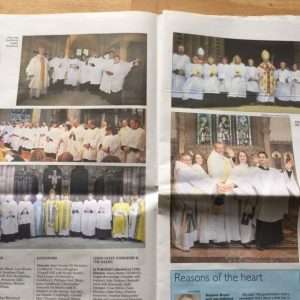A copy of the Church Times lies open on the kitchen table. It carries plentiful coverage of recent ordinations in the Church of England. The smiling faces that fill the photographs prompt a sense, perhaps, of regret; a niggling feeling of inadequacy; an awareness that before some of those pictured reach retirement, I shall have been laid to rest in a Co Down churchyard. There is a column of advice for those priests who are receiving curates, what to do and what not to do. Staring at one photograph, there is a moment to ponder the ministry upon which they are embarking.
Of course, the perfect priest is impossible to find, but I know that if I were sat in a pew, I would not want me as rector of the parish.
Age would be a factor in my considerations, I would want a priest who had been ordained long enough to have gained the necessary experience, but was young enough to project positive image of the church, the ideal priest is perhaps thirty-five years of age.
Physical attributes would be important, priests should be a model of healthiness. The ideal priest should not be grey haired, or overweight, or need to wear glasses. He should be an athletic sort, able to participate in sporting activities – a rugby or cricket player.
The ideal priest will have an ideal family living in an ideal home. People will comment on how perfect he is, what a fine example.
The ideal priest will be multi-talented. He will be a good musician with a fine voice; he will have an aptitude for arts and crafts; he will be gifted in mechanical and electronic matters; he will be knowledgeable in building and construction; he will be an astute manager able to lead his church in pursuit of definite strategies; he will be an imaginative fundraiser and a quick-witted financier; he will be a ready counsellor and psychologist, an expert in dealing with difficult people. The ideal priest will know without being told, will speak without having heard, will respond without being warned.
Among the many new clergy pictured in the pages of photographs, there are probably a few who approach the ideal and who, when I retire in ten years’ time, would be the sort of person I would like to see as rector. (There was consideration given by the Church of England to “fast-tracking” those who should be bishops, one such person in their upward trajectory would be an ideal incumbent.) I would not wish to see a grey-haired man in his mid-fifties with limited experience and few talents as my rector.
But then I look at the motley assortment who followed Jesus of Nazareth and draw comfort from the fact that even he was content with those who are less than ideal.
